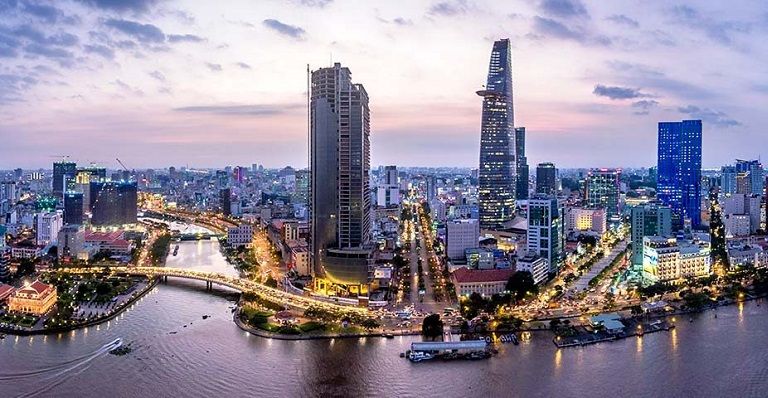Guide to start a business in Vietnam for foreigners
By Macy -20/10/2023 UTC.
Vietnam is an emerging market that offers exciting opportunities for foreign investors and entrepreneurs looking to start a business. With a fast-growing economy, young and tech-savvy population, and increasing consumer purchasing power, Vietnam has become an attractive destination for those looking to tap into new markets in Southeast Asia.
1. Ecommerce market opportunities in Vietnam
The ecommerce industry in Vietnam is booming. Internet penetration rates have risen rapidly, with over 70% of Vietnam's 96 million citizens now online. The majority are young, increasingly affluent and eager to shop online.
Vietnam’s ecommerce market is projected to grow at a compound annual growth rate of 14.1% from 2022-2027, reaching a value of $39 billion by 2025. This rapid growth is being fueled by rising internet and smartphone adoption, as well as changing consumer behaviors and lifestyles.

Some potential industries in Vietnam include:
Fashion: Online fashion is thriving, especially "ready-to-wear" items and accessories from both local and international brands. Vietnam has a young population who are fashion-conscious.
Electronics: Demand for electronics like smartphones, laptops, and tablets is surging. Consumers enjoy the convenience of shopping online and finding deals.
Health and beauty: Cosmetics, skincare and healthcare products are popular online purchases. Brand awareness is high and consumers are willing to pay for quality.
Food and grocery: While adoption is still early, more consumers are getting groceries delivered for convenience as lifestyles get busier.
Logistics infrastructure is improving, enabling faster and more reliable delivery services even to remote areas. This is expanding ecommerce accessibility.
With rising digital penetration and savvy young consumers, Vietnam presents an attractive opportunity for ecommerce entrepreneurs, especially in categories like fashion, electronics and cosmetics.
2. Can a foreigner start a business in Vietnam?
Yes, Vietnam allows and welcomes foreign investment and business. The Vietnamese government has relaxed rules, regulations and administrative procedures to facilitate foreign companies registering and establishing local operations.
According to Vietnam’s Law on Investment, there are no limitations on foreign ownership of companies. Foreign investors can establish 100% foreign-owned companies in Vietnam, except in select sectors like telecoms and banking which have foreign ownership caps.
Vietnam also provides incentives like tax holidays and reduced land lease rates to encourage foreign investment in promoted sectors like high-tech, green technology, and education.
Some popular investment/business models for foreign companies include:
Establishing a 100% foreign-owned company (common for manufacturing, retail, restaurants, etc)
Joint ventures with a local partner (helps overcome legal barriers, aids localization)
Opening a representative office (for foreign firms wanting to do market research before fully committing)
Buying shares in a local company / acquiring a local firm (for quick market entry by taking over an existing firm)
Getting an investment registration certificate (allows raising capital, share sales and profit repatriation)
Overall, Vietnam’s progressive reforms and business-friendly policies make it relatively straightforward for aspiring foreign entrepreneurs and companies to enter the local market.
3. Legal requirements for foreign business starting a business in Vietnam
While Vietnam welcomes foreign investment, there are some legal requirements foreign businesses need to follow to properly establish themselves:
Register business
Foreign companies must register their business and get proper licenses/certificates for their intended activities from the relevant Vietnamese authorities.

Obtain investment registration certificate
Foreign investors establishing a company in Vietnam must get an investment registration certificate (IRC) from the local Department of Planning and Investment. This allows raising capital, share sales and profit repatriation.
Adhere to foreign ownership rules
Most sectors allow 100% foreign ownership but some like telecoms and banking have ownership caps that foreign investors must comply with.
Meet capital requirements
There are minimum capital requirements for foreign companies depending on the sector. For example, tech companies need a minimum capital of $10,000.
Appoint a legal representative
Foreign companies must appoint a Vietnam-based legal representative to handle issues like tax filings and legal compliance. A trusted local partner is recommended.
Have company seal/stamp
A company seal or stamp engraving the company name is required for business and legal paperwork. Notary offices can make official seals.
Open a local bank account
Foreign firms need a Vietnamese bank account to handle payroll, taxes, and other local payments. Banks require business licenses to open an account.
By meeting Vietnam’s legal requirements early on, foreign companies investing in the country can avoid issues and focus on building their local business presence. Consulting experienced lawyers or advisors is recommended.
>>> Read more: How to sell on Shopee Vietnam: guide for cross-border sellers
4. Steps to register a business in Vietnam
Here are the key steps foreign investors need to take to formally register and establish a company in Vietnam:
Step 1. Choose business structure
Common structures include limited liability companies, joint-stock companies, partnerships, and representative offices. Each has different setup processes, legal obligations, and tax/capital requirements.
Step 2. Select company name
Name must be approved by proper authority. Rules include no duplication of existing names, no offensive/sensitive words, and should indicate business activities.
Step 3. Obtain investment certificate
Apply for an investment registration certificate (IRC) from the local planning and investment department. Outlines investment activities and guidelines.
Step 4. Get relevant business licenses
Depending on the nature of business operations, companies may need additional licenses like retail, distribution, tech, etc. from respective government bodies.
Step 5. Register charter and articles of association
Key documents outlining company purpose, organizational structure, capital, ownership equity structure, etc. müssenotarized and registered.
Step 6. Register for taxes
Sign up for applicable taxes like corporate income tax, value added tax, personal income tax, and import duties. Required to legally operate.
Step 7. Open a bank account
A business bank account in Vietnamese Dong is required for payroll, taxes and other local transactions. Account needs an investment license.
Step 8. Fulfill capital requirements
Company must have minimum capital deposited as required for its business sector before getting business licenses.
Step 9. Get company seal
Official engraved company seal required for legal documents and contracts. Made by licensed seal engravers.
By fulfilling these requirements, foreign companies can legally establish themselves in Vietnam. Consulting an ecommerce enabler in Vietnam like Ezbuy Japan can help you streamline this process.
5. Setting up multi-platform online stores in Vietnam
For ecommerce entrepreneurs, an important step is setting up online sales channels to start selling to Vietnamese consumers. Here are some popular options:
Domestic ecommerce platforms
Major local platforms include Shopee, Lazada, Tiki, Sendo and Tik Tok Shop. They enable sellers to easily create online stores targeted at Vietnamese shoppers. Tiki and Sendo are fully Vietnamese while Shopee, Lazada and Tiktok shop are regional players. These platforms handle local payment methods, logistics, and promotion.
Social commerce
Facebook, Instagram, Zalo and Tiktok are widely used in Vietnam. Setting up shoppable business profiles allows social selling to followers. Livestreaming to sell via social video has become popular.
Independent websites
For established brands, having a .vn domain website with Vietnamese language ordering, content and SEO allows direct sales. But requires bigger investment in traffic acquisition and technology.
Omnichannel retail
For some categories like cosmetics and electronics, having both a website and physical stores is preferred by consumers for experience and convenience. An integrated strategy is effective.
By utilizing multiple sales channels, ecommerce companies can maximize reach to best access Vietnam's growing online consumer base across platforms and locales. The right mix depends on product, brand positioning and current scale.
6. Fulfillment and Shipping for Foreign Sellers in Vietnam
Delivering products quickly and reliably is vital for any e-commerce business. For foreign companies, shipping and fulfillment can be especially challenging. Here are effective solutions used by overseas sellers:
Local warehousing
Storing inventory locally in Vietnam allows faster shipping times to customers nationwide. Ezbuy’s warehouses in major cities like Ho Chi Minh City and Hanoi connect sellers to nationwide delivery networks.
3PL logistics partners
Using third-party logistics providers offers convenience and reliability. Major players like Viettel Post, GHN and Lazada Express have extensive courier networks covering Vietnam. Integration, tracking and optimized delivery routes are benefits.
Last mile delivery
Partnering with carriers and on-demand drivers for last mile delivery improves convenience via COD, precise delivery times and location flexibility. Apps like Grab, Gojek and Now help.
Order management System (OMS) and Warehouse management System (WMS)
Inventory management software helps efficiently track and control stock across multiple warehouses, reducing stock-outs. Integrates with order channels.
Cross-border ecommerce zones
Special economic zones like the one in Ho Chi Minh City provide incentives, facilities and streamlined customs clearance for overseas sellers storing goods and fulfilling export orders.
Returns management
Local return centers enable smooth exchange/refund processing. Quickly reintegrating returned items back into saleable inventory is important.
With the right shipping setup, foreign ecommerce firms can overcome Vietnam's logistical challenges to reliably meet customer expectations, ensuring sustainable growth and satisfaction.
7. Ezbuy - a reliable enabler for foreign sellers to sell in Vietnam
Ezbuy Japan is an ecommerce enabler that empowers overseas companies to easily access and make sales in Vietnam through its integrated cross-border fulfillment solution.
When partnering with us, foreign businesses will receive:
Easy registration & onboarding: Fast and simple for overseas companies to sign up and get started selling to Vietnam.
Localized webstore creation: Helps create Vietnamese-localized online storefront to immediately start taking orders.
Warehousing & fulfillment: Provides warehouse space for inventory storage. Handles storage, packing and domestic shipping.
Payment collection: Supports popular Vietnam payment methods like bank transfers, e-wallets and cash on delivery.
Customer service: Vietnam-based team handles returns, exchanges and any buyer inquiries in native language.
Marketing support: Advice and assistance on digital marketing and promotions to boost visibility amongst Vietnamese consumers.
End-to-end support: Consultation and assistance across every aspect of cross-border ecommerce operations.
Ezbuy Japann has enabled over 200 international sellers and brands to easily penetrate the Vietnamese market, avoiding traditional barriers like regulations, marketing and fulfillment. It offers a proven model for overseas ecommerce success in one of Southeast Asia’s most exciting growth markets.
Website: https://ezbuy.jp/en
Email: [email protected]